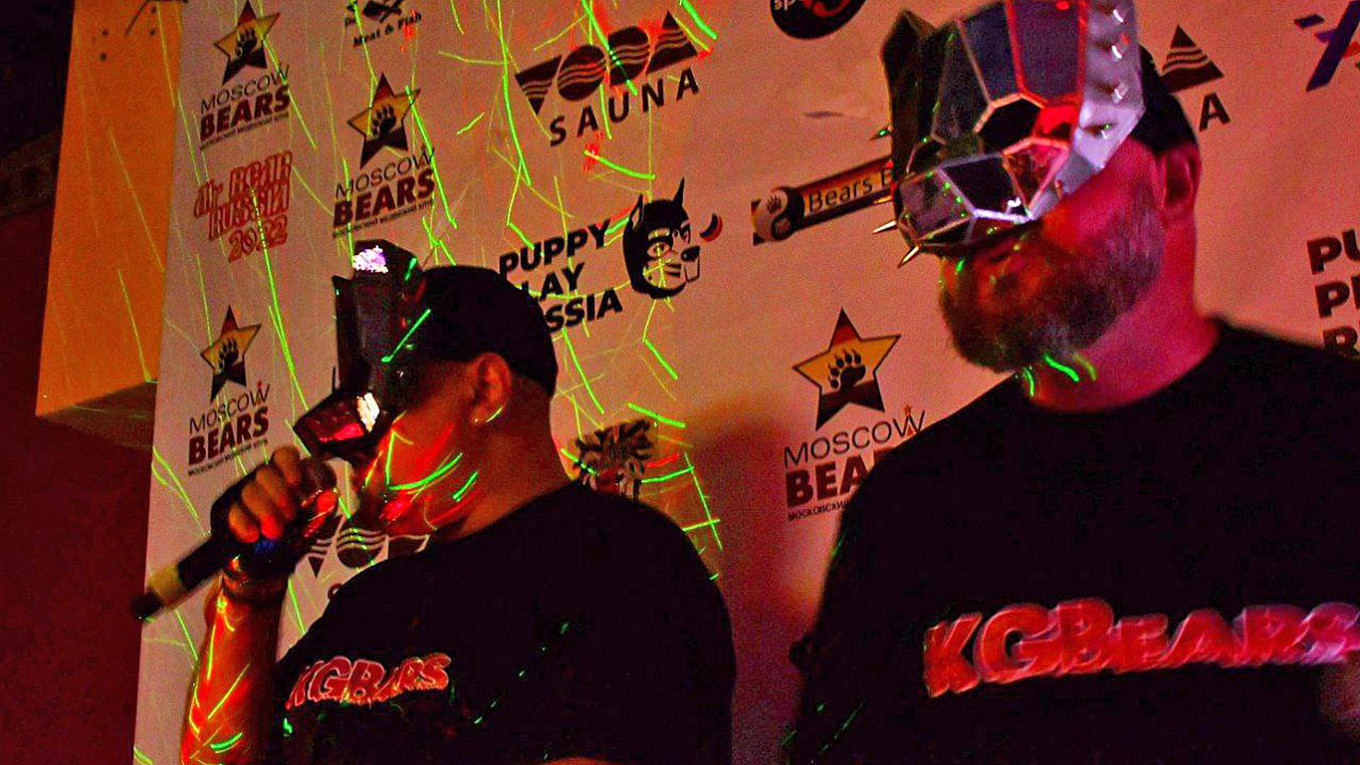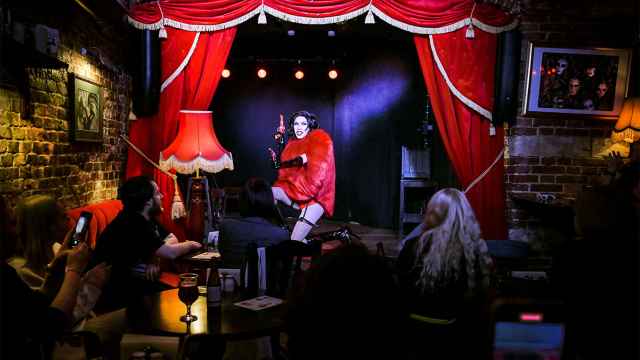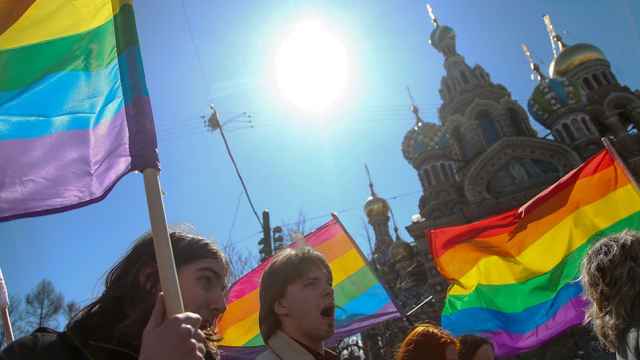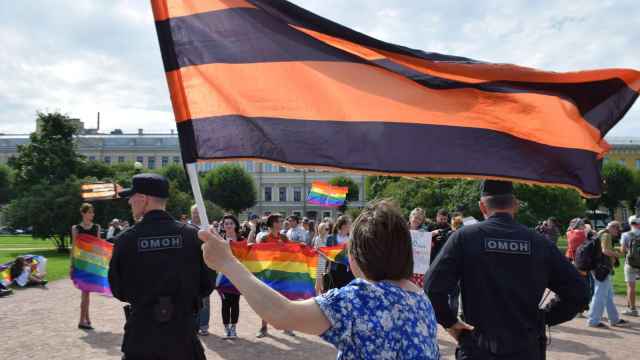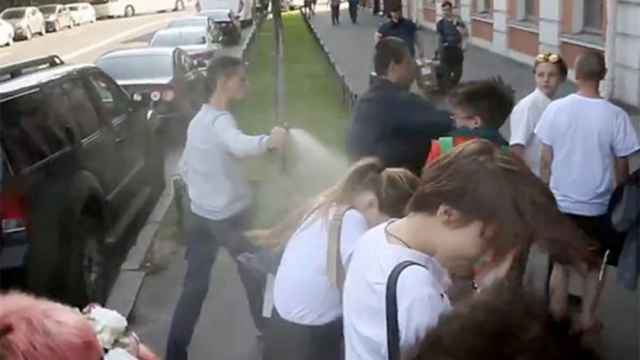ST. PETERSBURG — If you didn’t know Club Malevich existed you would never find it. There are no signs, windows, grand entrances or bouncers at the back of the defunct industrial complex housing its long, black, neon-lit bar and dance floor.
The location is the perfect hideaway for St. Petersburg’s secretive BEARsBURG society — a modern Russian incarnation of a gay sub-group which originally developed in the United States toward the end of the 1970s as a reaction against effeminate stereotypes of queer men.
On a Thursday night in November around twenty men have gathered to watch “Dance of the Forty-One,” a historical film based on a queer scandal involving cross-dressers at the highest level of early 20th century Mexican society. As the credits start to roll, the viewers scatter and make way for the highlight of the evening — a boozy session of belting bear karaoke, which breathes new and deeper-voiced life into the 90s ballads of Russian singer Tatiana Bulanova.
It’s a party behind an unmarked door in a country that has seen hate crimes against the LGBT community increase since the 2013 introduction of a law banning “gay propaganda among minors.”
“I have created my own bear state,” said Anton, who founded BEARsBURG in July 2021 as a grassroots society to bring together the larger, hairier men of St. Petersburg’s gay scene through social and cultural events. Like all the men interviewed for this story, he asked for his surname to be withheld.
A "bear," explained Anton, who is 47 and sports a golden-ginger beard, should have four key features — hairiness, bulk, friendliness and, crucially, masculinity.
“These are the base characteristics. But, if someone thinks he is a bear, we consider him to be a bear. The society is about inclusivity and friendliness above all,” he said.
Medvezhatniki, or bear gatherings, include group trips to the banya, café meet-ups, walking tours and film nights, and are organized over a handful of closed Telegram groups comprising upwards of 220 members. The group chats are the lifeblood of the society, members said, where they can exchange memes and memories, photos and suggestions, as well as bear news.
Messaging apps like Telegram have provided new ways for Russian gay men to build such networks, as well-run group chats can create a sense of togetherness and inclusivity.
Veteran bear LenikSPB, 49, whose Telegram profile picture shows him with a salt-and-pepper goatee and bear-emblazoned sports cap, said he likes BEARsBURG’s online openness.
“It’s really wonderful, with Telegram, that we can bring together bears and their admirers … I feel like I belong in this chat, and the BEARsBURG bear community.”
BEARsBURG puts no obligation on members to attend events and has no membership fee, in contrast with previous attempts to foster a bear community in St. Petersburg.
A rival society, SPBears, has been active since 2013 and represents a more formal group akin to international LGBT private clubs with membership fees, formalized calendar events and some collaborations with bear movements across Europe.
More activist-minded bears like Sergei, who has been heavily involved with SPBears for years, are skeptical that groups like BEARsBURG bring any tangible benefit to the LGBT cause in Russia.
“Russian bears are not engaged in activism … They are afraid to talk about the politics of LGBT people and are scared of publicity and public events … Our clubs in Moscow and St. Petersburg are for showing off. There is nothing useful or meaningful in these movements.”
No politics
BEARsBURG's Anton said one of his founding principles was to limit political discussion to avoid division, adding that he fell out with the SPBears over this sticking point.
Balancing diverging attitudes to the current political situation with the social activities that most bears want has not been straightforward.
Since the introduction of the 2013 “gay propaganda” law, the Kremlin has pursued an anti-LGBT agenda through laws that have reduced LGBT visibility and encouraged the hardening of anti-LGBT sentiment in the wider population. Since 2020, the constitution specifies that marriage is a union between a man and a woman, effectively banning gay marriage.
BEARsBURG’s own guidelines make it clear that it is not a space for activism or addressing these contemporary political LGBT issues, but instead for building a community and social interaction.
For tawny-bearded Evgeny, 33, who is new not only to BEARsBURG but to any kind of LGBT group, the sense of belonging the society offers helped him move forward with his life after he split with his partner of five years.
“It’s a kind of ecosystem in which various sub-groups combine different interests … There's a lot of positivity, a lot of goodness that we don’t have enough of in today’s world … I’m really glad I was able to join.”
A Message from The Moscow Times:
Dear readers,
We are facing unprecedented challenges. Russia's Prosecutor General's Office has designated The Moscow Times as an "undesirable" organization, criminalizing our work and putting our staff at risk of prosecution. This follows our earlier unjust labeling as a "foreign agent."
These actions are direct attempts to silence independent journalism in Russia. The authorities claim our work "discredits the decisions of the Russian leadership." We see things differently: we strive to provide accurate, unbiased reporting on Russia.
We, the journalists of The Moscow Times, refuse to be silenced. But to continue our work, we need your help.
Your support, no matter how small, makes a world of difference. If you can, please support us monthly starting from just $2. It's quick to set up, and every contribution makes a significant impact.
By supporting The Moscow Times, you're defending open, independent journalism in the face of repression. Thank you for standing with us.
Remind me later.



